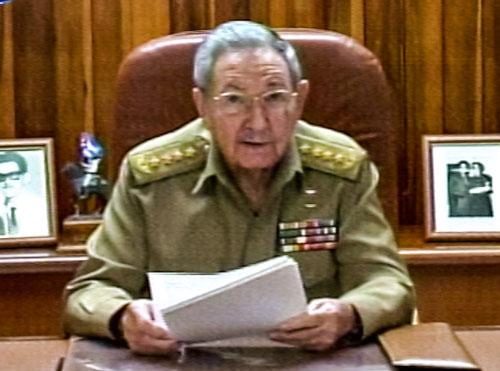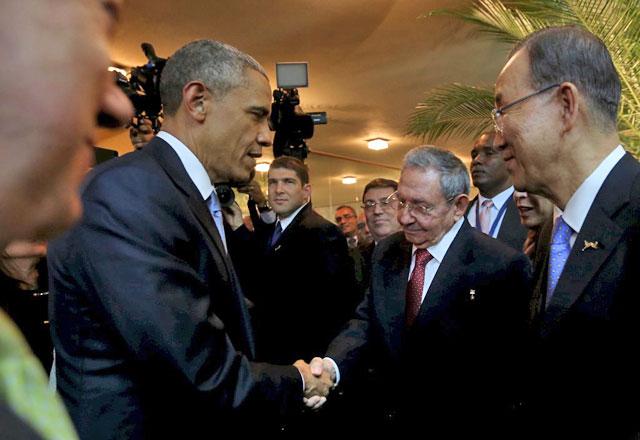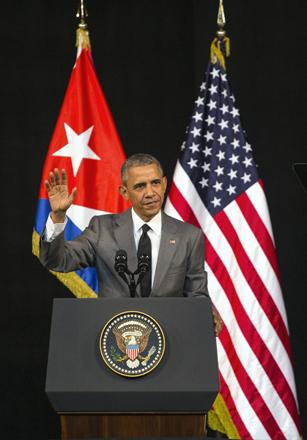You are here
Obama, Castro declare historic breakthrough in ties
By AFP - Dec 17,2014 - Last updated at Dec 17,2014

WASHINGTON — The United States and Cuba made a historic breakthrough in their Cold War stand-off Wednesday, moving to revive diplomatic ties and launch measures to ease a five-decade US trade embargo.
In the wake of a prisoner exchange, President Barack Obama said the United States was ready to review trade ties and to re-open its embassy in communist Cuba that has been closed since 1961.
Cuba’s President Raul Castro, in a simultaneous address in Havana, confirmed that the former enemies had “agreed to re-establish diplomatic ties” after more than half a century.
Castro cautioned that the issue of the embargo — which he called a “blockade” — remained to be resolved.
In Washington, Obama admitted the US embargo had failed and said he would approach the US Congress to discuss lifting it alongside the advances in diplomatic and travel links.
“We are all Americans,” Obama declared in Spanish, in a set-piece White House address marking a historic attempt to reassert US leadership in the Western hemisphere.
Obama hailed the support he said that Pope Francis, the first Latin American pontiff, and the Catholic Church had provided in brokering better relations between the long-time enemies.
‘Outdated approach’
The breakthrough came after Havana released jailed US contractor Alan Gross and a Cuban who spied for Washington and had been held for 20 years — and whom Obama called one of the most important US agents in Cuba.
The United States in turn released three Cuban spies, and Obama said he had instructed the US State Department to re-examine its designation of Cuba as a state sponsor of terrorism.
“We will end an outdated approach that for decades has failed to advance our interests and instead we will begin to normalise relations between our two countries,” Obama said.
“Through these changes, we intend to create more opportunities for the American and Cuban people and begin a new chapter among the nations of the Americas,” he added.
The United States imposed a trade embargo against Cuba — the Cold War foe closest to its shores — in 1960 and the two countries have not had diplomatic relations since 1961.
The ensuing stand-off was marked by incidents that threatened to turn the Cold War hot, such as the 1962 missile crisis, in which US vessels blocked the island to prevent the delivery of Russian nuclear arms, and the earlier Bay of Pigs invasion by US-backed Cuban exiles.
The embargo hurt the Caribbean island state’s economy, but it failed to unseat the communist governments led by the Castro brothers.
Obama now has only two years left in office, Fidel Castro is 88 and ailing, and Raul is 83. With the window for the rival leaders to revive relations, both sides were under pressure to make a gesture.
Senior Democratic lawmaker Dick Durbin, a member of the Senate foreign relations committee, hailed the move.
“Opening the door with Cuba for trade, travel and the exchange of ideas will create a force for positive change in Cuba that more than 50 years of our current policy of exclusion could not,” he said.
But Republican Cuban-American Senator Marco Rubio, a champion of the anti-Castro community in Florida, denounced the deal.
“The White House has conceded everything and gained little,” Rubio said, in a foretaste of the resistance that Obama will face as he tries to persuade Congress to back a full end to the embargo.
“All this is going to do is give the Castro regime, which controls every aspect of Cuban life, the opportunity to manipulate these changes to perpetuate itself in power.”
Just before Obama spoke, Gross, a 65-year-old US contractor who had been held for five years on allegations of spying, was welcomed back onto US soil by Secretary of State John Kerry.
Swap of ‘intel assets’
Also returning was an unnamed intelligence agent who had caught working for the US in Cuba and held for two decades.
“This man, whose sacrifice known to only a few, provided America with the information that allowed us to arrest the network of Cuban agents that included the men transferred to Cuba today as well as other spies in the United States,” Obama said.
“This man is now safely on our shores.”
In exchange for this second prisoner, the United States released three alleged Cuban spies, in what a US official called a “swap of intel assets.”
Both sides had previously made the release of their nationals a precondition for opening negotiations on warmer ties.
Gross was arrested in 2009 for distributing communications equipment to members of Cuba’s Jewish community while working as a contractor for the US Agency for International Development.
He was sentenced to 15 years in prison in 2011 after being convicted of “acts against the independence or territorial integrity of the Cuban state.”
Related Articles
Iran has seized on Washington's historic rapprochement with Cuba after five decades of Cold War standoff as proof that big power sanctions do not work.
US President Barack Obama and Cuba's Raul Castro heralded a new era of bilateral relations on Saturday as they both addressed a landmark Summit of the Americas ahead of historic one-on-one talks.
HAVANA — US President Barack Obama delivered an impassioned appeal for political liberties in Cuba, including freedom of expression and reli

















